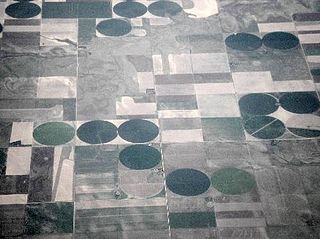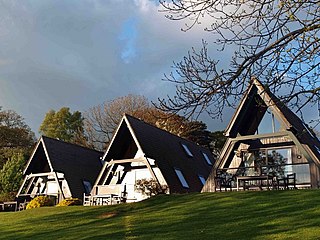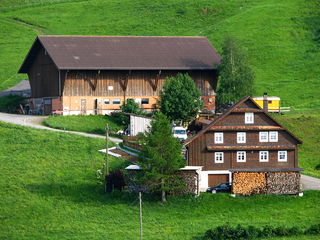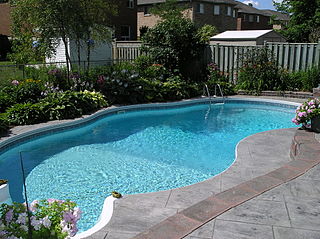Related Research Articles

Tourism is travel for pleasure or business; also the theory and practice of touring, the business of attracting, accommodating, and entertaining tourists, and the business of operating tours. The World Tourism Organization defines tourism more generally, in terms which go "beyond the common perception of tourism as being limited to holiday activity only", as people "traveling to and staying in places outside their usual environment for not more than one consecutive year for leisure and not less than 24 hours, business and other purposes". Tourism can be domestic or international, and international tourism has both incoming and outgoing implications on a country's balance of payments.

Agritourism or agrotourism involves any agriculturally based operation or activity that brings visitors to a farm or ranch.

A farm is an area of land that is devoted primarily to agricultural processes with the primary objective of producing food and other crops; it is the basic facility in food production. The name is used for specialized units such as arable farms, vegetable farms, fruit farms, dairy, pig and poultry farms, and land used for the production of natural fiber, biofuel and other commodities. It includes ranches, feedlots, orchards, plantations and estates, smallholdings and hobby farms, and includes the farmhouse and agricultural buildings as well as the land. In modern times the term has been extended so as to include such industrial operations as wind farms and fish farms, both of which can operate on land or sea.

Bed and breakfast is a small lodging establishment that offers overnight accommodation and breakfast. Bed and breakfasts are often private family homes and typically have between four and eleven rooms, with six being the average. In addition, a B&B usually has the hosts living in the house.

A resort is a self-contained commercial establishment that tries to provide most of a vacationer's wants, such as food, drink, swimming, lodging, sports, entertainment, and shopping, on the premises. The term resort may be used for a hotel property that provides an array of amenities, typically including entertainment and recreational activities. A hotel is frequently a central feature of a resort, such as the Grand Hotel at Mackinac Island, Michigan. Some resorts are also condominium complexes that are timeshares or owned fractionally or wholly owned condominium. A resort is not always a commercial establishment operated by a single company, but in the late 20th century, that sort of facility became more common.

A timeshare is a property with a divided form of ownership or use rights. These properties are typically resort condominium units, in which multiple parties hold rights to use the property, and each owner of the same accommodation is allotted their period of time. Units may be sold as a partial ownership, lease, or "right to use", in which case the latter holds no claim to ownership of the property. The ownership of timeshare programs is varied, and has been changing over the decades.

World Wide Opportunities on Organic Farms, or World Wide Organization of Organic Farms, is a loose network of national organizations that facilitate homestays on organic farms. As of June 2016, Australia with 2,600 hosts has the most host farms and enterprises, followed by New Zealand with 2,340 and United States with 2,052 hosts. The UK has 688 WWOOF hosts. While there are WWOOF hosts in 210 countries around the world, no central list or organization encompasses all WWOOF hosts. As there is no single international WWOOF membership, all recognised WWOOF country organizations strive to maintain similar standards, and work together to promote the aims of WWOOF.

A pension is a type of guest house or boarding house. This term is typically used in Continental European countries, in areas of North Africa and the Middle East that formerly had large European expatriate populations, and in some parts of South America such as Brazil and Paraguay. Pensions can also be found in South Korea, Japan, and the Philippines.
A guest ranch, also known as a dude ranch, is a type of ranch oriented towards visitors or tourism. It is considered a form of agritourism.

A vacation rental is the renting out of a furnished apartment, house, or professionally managed resort-condominium complex on a temporary basis to tourists as an alternative to a hotel. The term vacation rental is mainly used in the US. Other terms used are self-catering rentals, holiday homes, holiday lets, cottage holidays and gites.

A farmhouse is a building that serves as the primary quarters in a rural or agricultural setting. Historically, farmhouses were often combined with space for animals called a housebarn. Other farmhouses may be connected to one or more barns, built to form a courtyard, or with each farm building separate from each other.

A staycation, or holistay, is a period in which an individual or family stays home and participates in leisure activities within day trip distance of their home and does not require overnight accommodation. In British English the term has increasingly come to refer to domestic tourism: taking a holiday in one's own country as opposed to traveling abroad.
Wood Farm is a secluded farmhouse cottage property set on the British Royal Family's Sandringham Estate in Norfolk, England. Historically occupied by members of the Royal Family and their guests, the house has long been a favourite of Elizabeth II. From his retirement in 2017, the house was home to Prince Philip, Duke of Edinburgh.

Culinary tourism or food tourism or gastronomy tourism is the exploration of food as the purpose of tourism. It is considered a vital component of the tourism experience. Dining out is common among tourists and "food is believed to rank alongside climate, accommodation, and scenery" in importance to tourists.

Agriculture is one of the main industries in Taiwan. It contributes to the food security, rural development and conservation of Taiwan. Around 24% of Taiwan's land is used for farming.
Responsible tourism is a relatively modern concept in the Kingdom of Thailand that took root in the late-1990s. It is underpinned by the belief that tourism should develop in a manner that minimizes negative impacts on local communities, and wherever possible ensure that a positive symbiosis exists between hosts and visitors. Responsible travel promotes a respect for indigenous culture, the minimization of the negative environmental impacts of tourism, active participation in volunteering to assist local communities, and the structuring of businesses to benefit the final service provider rather than an international agent.

The German Youth Hostel Association or DJH is a not-for-profit, registered association. It was founded in 1919 to create an organized network of affordable and safe accommodation away from home for travelling school and youth groups and individuals all over the country. Today, the 438 youth hostels in the association still cater to school and youth groups but are also open to anyone else looking for an alternative to hotels - families, backpackers, business travellers, etc. Through the state (Bundesland) associations it is the representative of the 438 youth hostels in Germany and thus the largest member of the international youth association, Hostelling International (HI). The headquarters has its seat in Detmold and is divided into 14 state associations and 178 local and county volunteer associations. It has about 2,38 million members.
Tourism – travel for pleasure or business; also the theory and practice of touring, the business of attracting, accommodating, and entertaining tourists, and the business of operating tours. Tourism may be international, or within the traveller's country. The World Tourism Organization defines tourism more generally, in terms which go "beyond the common perception of tourism as being limited to holiday activity only", as people "traveling to and staying in places outside their usual environment for not more than one consecutive year for leisure, business and other purposes".
The National Children's Center for Rural and Agricultural Health and Safety (NCCRAHS) is a part of the National Farm Medicine Center, one of the research centers of the Marshfield Clinic Research Institute. The center is located headquartered in Marshfield, Wisconsin, and is primarily funded by the National Institute for Occupational Safety and Health (NIOSH), which is part of the Centers for Disease Control and Prevention (CDC). The director is Barbara C. Lee, PhD.

Erika Polmar is an agritourism entrepreneur and food industry activist in Oregon. She founded Plate & Pitchfork, a Farm Dinner series, and helped lead the effort to lobby for governmental relief for small food-industry businesses during the 2020 coronavirus pandemic.
References
- ↑ "Placer-Nevada Counties - Glossary of Terms - Eat Local, Start Now!". Archived from the original on 2010-06-08. Retrieved 2010-02-22.
- ↑ "What is Ecotourism? - the International Ecotourism Society - TIES". Archived from the original on 2010-02-10. Retrieved 2010-02-22.
- ↑ "About Geotourism -- National Geographic". National Geographic Society . 21 January 2017. Retrieved 16 April 2017.
- ↑ Chhabra, Esha. "Farm Stays On Airbnb Become More Popular During The Pandemic". Forbes. Retrieved 2021-10-31.
- ↑ "Agritourism - Farm Stays in Europe" . Retrieved 16 April 2017.
- ↑ "Great holiday deals and discounts of Holiday Farm in Italy" . Retrieved 16 April 2017.
- ↑ "Agriturismo in Italy - The Guide to quality Farmhouse in Italy!" . Retrieved 16 April 2017.
- ↑ "The World's Best Farmstays: Agritourism, Country Cottages & Rural Retreats" . Retrieved 16 April 2017.
- ↑ "Farm Stay Camping Australia" . Retrieved 16 April 2017.
- ↑ "Asian agriturism (Farm stay) resources". Archived from the original on 2011-12-30. Retrieved 2012-11-08.
- ↑ "Farm Vacations - Farm Stays and Guest Ranches - Farm Stay U.S." Retrieved 16 April 2017.
- ↑ "the Italian portal of farmhouses" . Retrieved 21 February 2021.
- ↑ "Community Supported Agriculture - LocalHarvest" . Retrieved 16 April 2017.